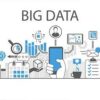Data forms an integral part of every sector in the global economy. Without data and other important production factors such as human capital and hard assets, modern economic activity would just not exist. A large amount of unstructured data from different sources such as social interactions, the internet and shopping transactions is generated on a daily basis and proper tools and a well-defined structure is required to extract valuable insights. A report on Big Data has revealed that a Fortune 1000 company can increase its net income by $65 million just by increasing its data accessibility potential by 10%.
For business enterprises to remain competitive in the present times, they have to be analytics-driven in order to gain exhaustive insights about their business and achieve a competitive edge over their rivals. Businesses have to collect, store and analyze data from varied sources for it to be able to indulge in analytics-driven activities such as improving customer experience, anomaly detection and remediation, service innovation and reduced time to market. Big Data will be used as the crux on which the growth and competition of business enterprises, their enhanced productivity and value creation for the world economy will be based on.
An effective big data insights methodology bestows various advantages for business enterprises:
Cost Reduction
Business enterprises can save a substantial amount on operational cost by utilizing big data technologies such as Hadoop and cloud based analytics. It is tough to compare traditional architectures such as warehouses and marts with big data technology because the functionalities are different. But there is a huge price difference between the implementation of traditional architecture and big data technology and this is where the advantage of big data in terms of cost is highlighted. Business enterprises will be benefited if they use big data technology to supplement tradition architecture rather than replacing them. Hadoop clusters are used to store and process large volumes of data whereas enterprise warehouses can be used for production and analytical applications.
Better Management of Data
Data processing platforms allow data scientists in a business enterprise to collect, analyze and examine different types of data. Though a lot of technicalities are involved in the collection and storage of data, the users of the big data and business intelligence tools allow them to manage data without having to know all the complicated technical details. This has made the mining of different data formats for specific purposes quite easy.
Minimizes Risk
Success of a business enterprise not only depends on how it is being run but also on how it prepares itself for the future. Big Data allows business enterprises to carry out predictive analysis by considering economic and social factors. This way the enterprise will be aware of the latest developments in its environment and industry. A detailed analysis of the customers and suppliers can be carried out comprehensively with the help of Big Data that can be used to take requisite action when there is risk of defaulting from either one of the parties.
Improved Decision Making
Big Data has been instrumental in improving decision making in organizations. Many business enterprises are looking towards in-memory analytics and Big Data driven by Hadoop clusters for better and faster decision making. Close to 65% of senior executives in any enterprise base their decisions on hard analytic information. Enterprises are also able to take better decisions by analyzing new sources of data using natural language processing tools that gives them a better understanding of customer satisfaction and how to improve it. This has helped business enterprises to drastically improve their capability to predict customer attrition models and take decisions that help them to improve customer satisfaction levels.
Better Products and Services
Big Data plays an important role in helping enterprises understand how consumers perceive their products so that necessary improvements can be brought about in the product or service and changes can be made with regard to their marketing. The sentiments of the customers pertaining to a particular product can be gauged by analyzing the unstructured data from social media. Big Data also allows enterprises to test computer aided designs of different variations of a product and analyze how minor changes in the product material or size affects the lead time, cost and its performance in the market and then bring about changes in the production process accordingly.
Data Security
Using Big Data Tools, an enterprises’ entire data landscape can be mapped to detect any internal threats such as potentially sensitive information which is left unprotected. This anomaly can be fixed by making sure that the information meets all the regulatory requirements and can be accessed only by the appropriate personnel. It has been found that data security breach, on an average, causes a loss of $194 per customer to a business enterprise. Big Data hosting and technology partners build secure infrastructure that can drastically save a large percentage of an enterprises’ annual revenues.
Real Time Customization
Real time data is extremely important when business enterprises want to retain the consumer’s confidence in them. Termed as ‘nowcasting’, it has been used extensively to predict the consumer’s next move in real time. Web based businesses find this particularly useful as Big Data analytics allows them to render a personalized feel to the website with respect to each visitor depending on their age, nationality and current search item. Retail giant Amazon has pioneered this method by using its real time, item based, collaborative filtering (IBCF) method to customize the webpage to feature additional options such as ‘Customers who bought this item also bought’ and ‛Frequently bought together’. This method has enabled Amazon to increase its revenue by almost 20%.
Offers Enterprise wide Insights
A study by Gartner has revealed that close to 73% of enterprises have invested or are planning to invest in Big Data by the year 2016. In retrospect, when users wanted a large amount of data to be analyzed, they used to approach their IT colleagues as the users lacked the technical know-how to tackle such a task. The introduction of Big Data tools has provided the ground work for the development of dynamic systems wherein faster searches can be conducted as repeatability is built into the algorithm. The end result is that the user gains the ability to extract valuable insights which otherwise would have remained hidden. Interactive visualization tools allow the users to view, analyze and generate value from the data.
Create New Revenue Streams
Enterprises that utilize Big Data to analyze their market and consumers can sell the non-personalized trend data to bigger enterprises which operate in similar segment and create a platform for an entirely new revenue stream. For example, banks provide loans to various business enterprises and are therefore privy to details which are available to none. Banks can generate additional revenue by providing business loans which are accompanied by advice on which area to setup the business in to ensure maximum return on investment. Banks have a vast amount of data on various business enterprises which have been successful after having acquired loan from the bank. Banks can utilize this information to provide investment advice for a nominal fee.
Big Data analytics has helped business enterprises deliver value throughout the world. Though there remains some issues regarding how Big Data will evolve in the future, the days of questioning its effectiveness is long gone. By 2020, the amount of digital information will grow from 3.2 zettabytes to 40 zettabytes. Various enterprises have already achieved cost reductions, provided new offerings for customers and showcased faster and improved decision making. Traditional businesses might remain the same but the integration of innovative technologies has brought about changes in the business models and processes resulting in greater agility.
Arvind Rongala is Director, Invensis Learning, a global training and certification provider in the IT, technical and business management fields. Under his stellar leadership, Invensis Learning has trained 50,000 plus professionals across the World, and is a trusted partner for Fortune 1000 companies. Associated with the Invensis group of companies for nearly a decade, Arvind is now a recognized name in the learning and continuing education sphere. His views on topics like Agile Project Management, DevOps, IT Security and Governance, Quality Management and Digital Marketing are valued by media, industry peers and the business community at large.

1 Comment
Leave a Reply
Cancel reply
Leave a Reply
This site uses Akismet to reduce spam. Learn how your comment data is processed.
























































































































































































Laurie
March 10, 2016 at 1:25 pm
Data is an important thing for businesses, love the article – thanks for sharing!